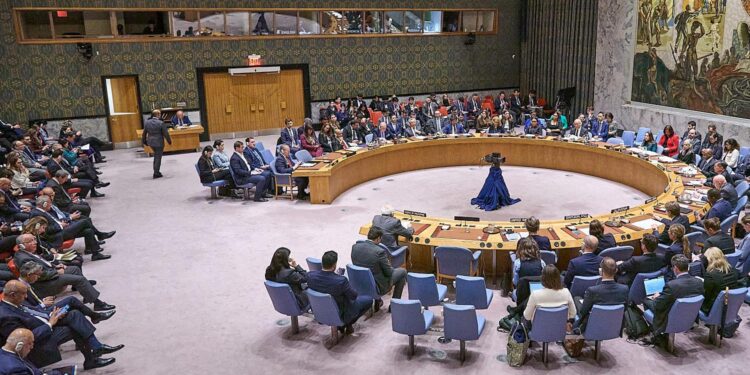In a significant development at the United Nations, five countries have secured seats on the UN Security Council, marking a pivotal moment in global diplomacy. The newly elected members are set to play crucial roles in addressing some of the world’s most pressing security challenges over the coming years. This election, closely watched by international observers, reflects shifting geopolitical dynamics and underscores the ongoing importance of the Security Council in maintaining international peace and security.
New Members Take on Security Council Challenges Amid Global Tensions
Stepping into a pivotal role on the world stage, the newly elected members of the UN Security Council confront an array of pressing global issues, ranging from escalating geopolitical conflicts to urgent humanitarian crises. These countries enter the Council at a time when unity and decisive action are paramount, expected to balance national interests with the broader goals of peace and security. Their diverse backgrounds promise fresh perspectives but also highlight the challenges of forging consensus in an increasingly polarized international environment.
The incoming members have outlined key areas of focus that include:
- Conflict resolution in volatile regions
- Counter-terrorism initiatives and intelligence sharing
- Climate security and the impact of environmental instability
- Human rights protection amidst ongoing crises
With global tensions simmering, observers watch closely to see how these nations will navigate the complex dynamics of power, diplomacy, and responsibility, shaping the Security Council’s agenda through 2025.
| Country | Term Length | Priorities |
|---|---|---|
| Albania | 2 Years | Conflict Mediation, Human Rights |
| Brazil | 2 Years | Climate Security, Peacekeeping |
| Gabon | 2 Years | Regional Stability, Counter-Terrorism |
| Ghana | 2 Years | Humanitarian Aid, Conflict Resolution |
| United Arab Emirates | 2 Years | Economic Security, Diplomacy |
Regional Implications and Strategic Priorities of Newly Elected Countries
The election of five new members to the UN Security Council marks a critical shift in regional dynamics and geopolitical focus. Each country brings distinct priorities shaped by their domestic challenges and foreign policy goals, inevitably influencing the Council’s agenda. For instance, those from emerging markets intend to spotlight economic security and sustainable development, while nations from conflict-prone regions are expected to advocate for enhanced peacekeeping and conflict resolution mechanisms. This convergence of diverse interests promises to reshape diplomatic negotiations and decision-making processes within the Council.
Strategically, the new members are likely to concentrate on several key areas that reflect their national priorities and regional alliances, including:
- Security Sector Reform: Emphasizing state-building and counterterrorism efforts in fragile regions.
- Climate Security: Linking environmental challenges with global peace and stability.
- Humanitarian Access: Facilitating aid delivery in war-torn areas.
- Multilateral Engagement: Strengthening partnerships with other UN bodies and global powers.
Their approach is expected to encourage greater regional collaboration and spearhead initiatives that reflect evolving global priorities.
| Country | Regional Bloc | Key Priority |
|---|---|---|
| Country A | Africa | Peacekeeping Expansion |
| Country B | Asia-Pacific | Climate Security |
| Country C | Europe | Humanitarian Access |
| Country D | Latin America | Security Sector Reform |
| Country E | Middle East | Multilateral Engagement |
Enhancing Collaboration and Accountability for Effective Council Governance
In the wake of the recent election results, it is crucial that the newly elected members prioritize building a culture of transparency and shared responsibility. Effective governance on the Security Council depends on seamless communication channels and clear delineation of duties among member states. By fostering open dialogue and mutual trust, these countries can enhance their ability to navigate complex international issues and deliver cohesive policy outcomes. Mechanisms such as regular performance reviews and public reporting will serve as vital tools to maintain accountability throughout their tenure.
To support these objectives, several best practices have emerged as essential for council members aiming for impactful collaboration:
- Implementing cross-national working groups to address specific regional conflicts
- Adopting technology-driven platforms for real-time information sharing
- Encouraging proactive engagement with UN agencies and civil society
- Institutionalizing feedback loops to evaluate governance effectiveness
| Collaboration Strategy | Expected Outcome | Accountability Measure |
|---|---|---|
| Joint Intelligence Sharing | Faster conflict resolution | Quarterly impact reports |
| Unified Voting Blocks | Stronger global influence | Transparent voting records |
| Stakeholder Consultations | Inclusive decision-making | Public session summaries |
To Wrap It Up
As the newly elected members prepare to take their seats, global attention will focus on how they navigate the complex challenges facing the United Nations Security Council. Their tenure will be closely watched, as the international community looks for decisive action on issues ranging from peacekeeping to conflict resolution. With five countries now set to influence the Council’s agenda, the coming months promise a pivotal chapter in global diplomacy.
















